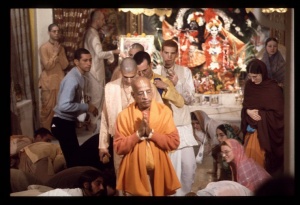UK/Бґ. 2.61

TEXT 61
- та̄ні сарва̄н̣і сам̇йамйа
- йукта а̄сı̄та мат-парах̣
- ваш́е хі йасйендрійа̄н̣і
- тасйа праджн̃а̄ пратішт̣гіта̄
Послівний переклад
та̄ні—ті чуття; сарва̄н̣і—усі; сам̇йамйа—володіючи; йуктах̣—будучи заглибленим; а̄сı̄та—слід перебувати; мат-парах̣—в стосунках зі Мною; ваш́е—повністю підкорені; хі—звичайно; йасйа—того, чиї; індрійа̄н̣і—чуття; тасйа—його; праджн̃а̄—свідомість; пратішт̣гіта̄—той, хто укріпився.
Переклад
Того, хто приборкує свої чуття і повністю владає ними, хто зосереджує свою свідомість на Мені, вважають людиною із стійким інтелектом.
Коментар
Вища досконалість йоґи полягає в свідомості Кр̣шн̣и, про що ясно сказано в даному вірші. Без свідомості Кр̣шн̣и неможливо підкорити свої чуття. Як було згадано вище, великий мудрець Дурва̄са̄ Муні посварився з Маха̄ра̄джею Амбарı̄шею й через гордощі впав у безпідставну лють. Таким чином він не зумів стримати свої почуття. Хоча цар не був таким могутнім йоґом, як мудрець, проте, бувши відданим Господа, мовчки терпів несправедливі закиди, внаслідок чого й здобув перемогу. Цар зміг керувати своїми почуттями, бо мав якості, які описано в Ш́рı̄мад-Бга̄ґаватам (9.4.18 – 20) таким чином:
са ваі манах̣ кр̣шн̣а-пада̄равіндайор вача̄м̇сі ваікун̣т̣га-ґун̣а̄нуварн̣ане карау харер мандіра-ма̄рджана̄дішу ш́рутім̇ чака̄ра̄чйута-сат-катгодайе мукунда-лін̇ґа̄лайа-дарш́ане др̣ш́ау тад-бгр̣тйа-ґа̄тра-спарш́е ’н̇ґа-сан̇ґамам ґгра̄н̣ам̇ ча тат-па̄да-сароджа-саурабге ш́рı̄мат-туласйа̄ расана̄м̇ тад-арпіте па̄дау харех̣ кшетра-пада̄нусарпан̣е ш́іро хр̣шı̄кеш́а-пада̄бгівандане ка̄мам̇ ча да̄сйе на ту ка̄ма-ка̄мйайа̄ йатготтамаш́лока-джана̄ш́райа̄ ратіх̣
“King Ambarīṣa fixed his mind on the lotus feet of Lord Kṛṣṇa, engaged his words in describing the abode of the Lord, his hands in cleansing the temple of the Lord, his ears in hearing the pastimes of the Lord, his eyes in seeing the form of the Lord, his body in touching the body of the devotee, his nostrils in smelling the flavor of the flowers offered to the lotus feet of the Lord, his tongue in tasting the tulasī leaves offered to Him, his legs in traveling to the holy place where His temple is situated, his head in offering obeisances unto the Lord, and his desires in fulfilling the desires of the Lord … and all these qualifications made him fit to become a mat-para devotee of the Lord.”
The word mat-para is most significant in this connection. How one can become mat-para is described in the life of Mahārāja Ambarīṣa. Śrīla Baladeva Vidyābhūṣaṇa, a great scholar and ācārya in the line of the mat-para, remarks, mad-bhakti-prabhāvena sarvendriya-vijaya-pūrvikā svātma-dṛṣṭiḥ su-labheti bhāvaḥ. “The senses can be completely controlled only by the strength of devotional service to Kṛṣṇa.” Also, the example of fire is sometimes given: “As a blazing fire burns everything within a room, Lord Viṣṇu, situated in the heart of the yogī, burns up all kinds of impurities.” The Yoga-sūtra also prescribes meditation on Viṣṇu, and not meditation on the void. The so-called yogīs who meditate on something other than the Viṣṇu form simply waste their time in a vain search after some phantasmagoria. We have to be Kṛṣṇa conscious – devoted to the Personality of Godhead. This is the aim of the real yoga.